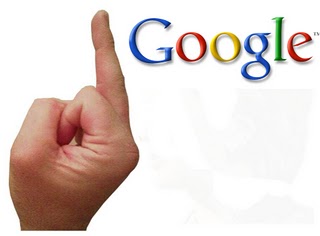You share your most intimate secrets with your search engine without even thinking: medical, financial and personal issues, along with all the day to day things that make you, well, you. All of that personal information should be private, but on Google it’s not. On Google, your searches are tracked, mined, and packaged up into a data profile for advertisers to follow you around the Internet through those intrusive and annoying ever-present banner ads, using Google’s
massive ad networks, embedded across millions of sites and apps.
In fact, it’s a myth that you need to track people to make money in web search. When you search ‘car’ we can show you a car ad without knowing anything about you. That’s how
we make money and it doesn't involve tracking because it is based on the keyword and not the person. Google could do this too; they just choose not to— all that tracking is to power their ad networks so that ads can follow you around the Internet using your search history and other information they have on you.
So-called incognito mode won’t protect you either. That’s another myth. “Incognito” mode isn’t really incognito at all. It’s an extremely misleading name and in my opinion should be changed. All it does is delete your local browsing history after your session on your device, but does nothing from stopping any website you visit, including Google, from tracking you via your IP address and other tracking mechanisms like
browser fingerprinting. Here’s the fine print:
To keep your searches private and out of data profiles, the government, and
other legal requests, you need to use
DuckDuckGo. We don’t track you at all, regardless what browsing mode you are in.
Each time you search on DuckDuckGo, it’s as if you’ve never been there before. We simply don’t store anything that can tie your searches to you personally, or even tie them together into a search history that could later
be tied back to you. For more details, check out our
privacy policy.
#2 — Block Google trackers lurking everywhere.
Google tracks you on
more than just their search engine. You may realize they also track you on YouTube, Gmail, Chrome, Android, Gmaps, and all the other services they run. For those, we recommend using
private alternatives like DuckDuckGo for search. Yes, you can live Google-free. I’ve been doing it for many years.
What you may not realize, though, is Google trackers are actually lurking behind the scenes on
75% of the top million websites. To give you a sense of how large that is, Facebook is the next closest with 25%. It’s a good bet that
any random site you land on the Internet will have a Google tracker hiding on it. Between the two of them, they are
truly dominating online advertising, by some measures literally making up
74%+ of all its growth. A key component of how they have managed to do that is through all these hidden trackers.
Google Analytics is installed on most sites, tracking you behind the scenes, letting website owners know who is visiting their sites, but also feeding that information back to Google. Same for the ads themselves, with Google running three of the largest non-search ad networks installed on millions of sites and apps: Adsense, Admob, and DoubleClick.
You know those ads that creepily follow you around everywhere? Most of those are actually run through these Google ad networks, where they let advertisers target you against your search history, browsing history, location history and other personal information they collect. Even less well known is they also enable advertisers like
airlines to charge you different prices based upon your personal information.
These ads are not only annoying — they are literally designed to manipulate you through targeting to make you buy more things, and just showing them to you is an act of Google profiting off of your personal information.
At DuckDuckGo, we’ve expanded beyond our roots in search, to protect you no matter where you go on the Internet. Our
DuckDuckGo browser extension and mobile app is available for all major browsers and devices, and blocks these Google trackers, along with the ones from Facebook and countless other data brokers. It does even more to protect you as well like providing smarter encryption.
#3 — Get unbiased results, outside the Filter Bubble.
When you search, you expect unbiased results, but that’s not what you get on Google. On Google, you get results tailored to what they think you’re likely to click on, based on the data profile they’ve built on you over time from all that tracking I described above.
That may appear at first blush to be a good thing, but when most people say they want personalization in a search context they actually want localization. They want local weather and restaurants, which can actually be provided without tracking, like we do at DuckDuckGo. That’s because approximate location info is automatically embedded by your computer in the search request, which we can use to serve you local results and immediately throw away without tracking you.
Beyond localization, personalized results are dangerous because to show you results they think you’ll click on, they must filter results they think you’ll skip. That’s why it’s called the Filter Bubble.
So if you have political leanings one way or another, you’re
more likely to get results you already agree with, and less likely to ever see opposing viewpoints. In the aggregate this leads to increased echo chambers that are significantly contributing to our increasingly polarized society.
This Filter Bubble is especially pernicious in a search context because you have the expectation that you’re seeing what others are seeing, that you’re seeing the “results.” We’ve done studies over the years where we have people search for the same topics on Google at the same time and in “Incognito” mode,
and found they are significantly tailored.
On DuckDuckGo, we are committed to not putting you in the Filter Bubble. We don’t even force people into a local country index unless they explicitly opt-in.
#4 — We listen.
Google is notoriously hard to get a hold of.
Locked out of your Gmail account? Sorry, we can’t help you.
The Knowledge Graph says you’re dead? That’s unfortunate. Unless you’re a journalist or influencer of some kind, good luck getting anyone at Google to listen.
Meanwhile at DuckDuckGo we read every piece of feedback we get. We respond
on social media. In short, we listen.
My DMs are open and I read all the email sent to me personally. Feel free to reach out.
#5 — We don’t try to trap you in our “ecosystem.”
It used to be that you search on Google and then you click off to the top result. Over time, Google
bought more and more companies and launched more and more of their own competing services, favoring them over others in their search results. Google Places instead of Yelp, TripAdvisor, etc. Google Products instead of Amazon, Target, etc. They’re in travel, health, and
soon jobs. Anywhere there is money to be made, you can expect them to get into it eventually.
Even when you do click off,
Google AMP tries to still trap you in Google. And these tactics are not just on the search engine.
On Android on many implementations there is immovable Google search widget and you can’t even change its search engine if you want to. By just installing it by default, this behavior is a direct analogue to
Microsoft putting IE on Windows in the 1990s, but worse since it takes up more of the smaller screen. The same is true for
other Google services on Android as well, forcing carriers to bundle and promote them. We personally have similar issues with Chrome search engine integration.
At DuckDuckGo, we aren’t trying to take over the world. We don’t have an “ecosystem” to trap you in. We just want to help you get to where you want to go as fast as possible, and protect you as much as we can in that process.
#6 — We have !bangs.
To further this point, we have a
built-in feature called bangs that enables you to search other sites directly, completely skipping DuckDuckGo if you like (But remember, you’ll be subject to those other sites’ privacy policies, including their data collection practices). Here’s how it works. Let’s say you know you want to go to the Wikipedia article for ducks. You can just search for “!w duck” and we will take you right there.
The ! tells DuckDuckGo you want to use a bang shortcut, and the w is an abbreviation for Wikipedia. You can use the full name, though we have a lot of shortcuts such as !a for Amazon, !r for Reddit, etc. There are literally thousands of sites that this feature works with, and so most sites you think of will probably work. It also works with our autocomplete so you can see what’s there easily.
If you routinely search a particular site, like Stack Overflow for coding answers or Baseball Reference for stats or All Recipes for something to make, you can just go right there.
If DuckDuckGo is your default search engine, you can just type this right into your browser's address bar, and skip loading our search engine altogether. We will just route you to the right place!
#7 — We strive for a world where you have control over your personal information.
Our vision is to raise the standard of trust online. If you share this vision, supporting DuckDuckGo helps us make progress towards it. For the past seven years,
we’ve been donating a substantial portion of our profits to organizations that also work towards the Internet we want — an open Internet where you can take control of your personal information.
We believe that privacy policies shouldn’t be default “collect it all," but instead offer a clear and compelling case as to what benefits you get by giving up your personal information. If you
share this view for the future of data privacy, you can vote with your feet.
#8 — Our search results aren’t loaded up with ads.
For many Google searches, most of the entire first page is ads. On mobile it can be even worse.
Not so on DuckDuckGo. We keep ads to a minimum, and naturally they're non-tracking ads, based only on search keywords and not on a personal profile or search history. In fact, as stated above, it’s a myth that you need to track people to make money in web search. When you search ‘car’ we can show you a car ad without knowing anything about you, based on the keywords you type in.
#9 — Search without fear.
When people know they are being watched, they change their behavior. It's a well-documented behavior called the chilling effect, and it happens on Google. For example,
an MIT study showed that people started doing fewer health searches on Google after the Snowden revelations, fearing that their personal ailments might get out.
“Suppressing health information searches potentially harms the health of search engine users and… In general, our results suggest that there is a chilling effect on search behavior from government surveillance on the Internet.”
Your searches are your business, and you should feel free to search whatever you want, whenever you want. You can easily escape this chilling effect on DuckDuckGo where you are anonymous.
#10 — Google is simply too big, and too powerful.
Google is GIANT, the epitome of Silicon Valley big tech, with a
market cap of around 750 Billion dollars (at the time of writing),
75,000 employees, dominating search, browsing, online advertising, and more, with tentacles in everything tech, online and offline. Last year they
outspent every other company on lobbying Washington.
By comparison, DuckDuckGo is tiny. We’re currently a team of about 45 people, scattered across the globe; I’m in Pennsylvania. We have a very narrow focus: helping you take control of your personal information online.
The world could use more competition, less focus on ad tracking, fewer eggs in one basket.
Join the Duck Side!







